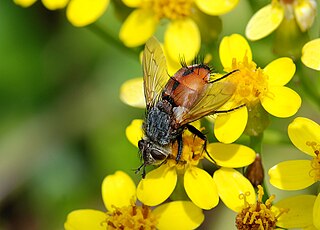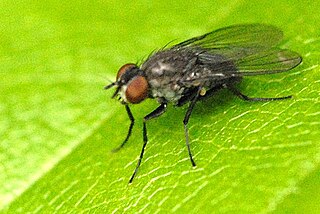
The Anthomyiidae are a large and diverse family of Muscoidea flies. Most look rather like small houseflies, but are commonly drab grey. The genus Anthomyia, in contrast, is generally conspicuously patterned in black-and-white or black-and-silvery-grey. Most are difficult to identify, apart from a few groups such as the kelp flies that are conspicuous on beaches.

Delia flies are members of the Anthomyiidae family within the superfamily Muscoidae. The identification of different species of Delia can be very difficult for non-specialists as the diagnostic characteristics used for immature and/or female specimens may be inconsistent between species. Past taxonomic keys were not as comprehensive in their identification of Delia specimens; they were either too reliant on genetic characteristics, focused solely on a specific life stage, or were focused only on certain species. However current taxonomic keys aim to be more thorough by not only including morphological diagnostics for males, females, and immature specimens of various species, but also their genetic make-up or molecular barcode.

Lucilia is a genus of blow flies in the family Calliphoridae. Various species in this genus are commonly known as green bottle flies.

Fannia is a very large genus of approximately 288 species of flies. The genus was originally described by the French entomologist Jean-Baptiste Robineau-Desvoidy in 1830. A number of species were formerly placed in the genus Musca.

The genus Scathophaga are small to medium sized predatory flies that for the most part, have larvae that feed on other insect larva within animal dung or decaying vegetable matter. Many are highly variable, sometimes producing small, infertile males that superficially resemble females. This species is an example of an organism which may selectively store the sperm of multiple males, as females have three to four spermathecae.

Tachina is a genus of large flies in the family Tachinidae. There are approximately 600 species worldwide. Most have larvae that are parasitoids of Lepidopteran caterpillars.
Masicera is a genus of parasitic flies in the family Tachinidae. There are more than 50 described species in Masicera.

Thricops is a genus of true flies of the family Muscidae.

Coenosia is a very large genus of true flies of the family Muscidae. Coenosia are known as tiger flies since they are predators and hunt many kinds of insects and other invertebrates.
Caricea is a genus of house flies, in the family Muscidae. There are at least 30 described species in Caricea.

Leucophora is a genus of root-maggot flies in the family Anthomyiidae. There are at least 60 described species in Leucophora.

Cordilura is a genus of dung flies in the family Scathophagidae. There are more than 90 described species in Cordilura.

Chirosia is a genus of root-maggot flies in the family Anthomyiidae. There are over fifty described species in Chirosia.

Egle is a genus of willow catkin flies in the family Anthomyiidae. There are at least 40 described species in Egle.
Odontomera is a genus of flies in the family Richardiidae. There are about 19 described species in Odontomera.

Alliopsis is a genus of root-maggot flies in the family Anthomyiidae. There are at least 70 described species in Alliopsis.














